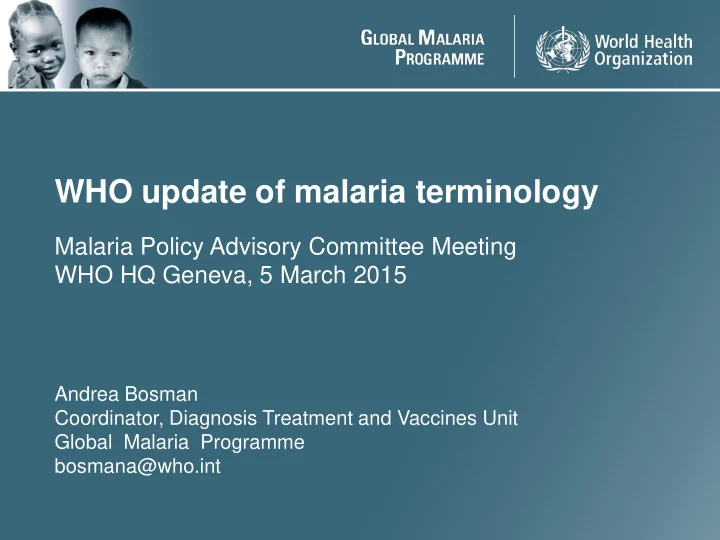

WHO update of malaria terminology Malaria Policy Advisory Committee Meeting WHO HQ Geneva, 5 March 2015 Andrea Bosman Coordinator, Diagnosis Treatment and Vaccines Unit Global Malaria Programme bosmana@who.int 1 1
TERMINOLOGY of MALARIA and of MALARIA ERADICATION Report of a Drafting Committee (1963) 2 2
WHO Evidence Review on MDA, MSAT and FSAT 20 – 22 April 2015 Over recent years there has been a proliferation of new terms in relation to malaria in the scientific literature, media and technical reports, and an increase in the number of terms that have a new or modified use and meaning (e.g. hotpops, hotspots, malaria sources and sinks, proactive infection detection, reactive infection detection, reactive targeted parasite elimination, network testing, time-location testing, dry season vector control HiFSAT – highly focussed screening and treatment). To complicate matters further: o sometimes terms are used to mean different things (e.g. case, screening); o sometimes, several similar terms are used to mean the same thing (e.g. MSAT, MTAT and MSTAT, FSAT and FTAT, MDA and Targeted Malaria Elimination or Targeted Parasite Elimination or Targeted Chemo-Elimination, mass primaquine preventive (or prophylactic) treatment); o some terms are used with different meanings by different public health programmes (e.g. elimination, certification, preventive chemotherapy). 3 3
Phased approach in updating terminology Terms that were and are still relevant and properly described – each definition or description can be reviewed for any need to update the language, but generally these terms could be considered “good as they stand”. Terms that have been used in the past and have value in an historical perspective, but are not really in current use (e.g. the endemicity categories and some of the spraying terminology); these terms may be important to keep for historical purposes, and could simply be updated in language. Terms that are relevant today but may have taken on a new and modified use and meaning – these terms need to be reviewed and possibly redefined, or at least updated so that the language of the definition reflects their current use. New terms that have come into use and may need to be included and clearly defined. 4 4
Process & timelines Desk Review March - May WHO WHO Malaria Terminology Malaria MPAC Writing Committee Definitions Sept June - August New & Final List WHO Priority Review Updated Terms & Departments Terms Definitions Definitions (i.e. NTDs) Scientific Literature Terminology 5 5
Phase 1 – desk review a. Compile all WHO definitions of terms used in WHO malaria publications since 1995 , in addition to those contained in the glossary of “WHO Terminology of malaria and of malaria eradication, 1963 ”; b. Compile the specific WHO definitions used by other WHO departments for the same terms (e.g. preventive chemotherapy for NTDs); Identify from systematic literature research over the past 10 years recurrent c. terms that are similar but with different meanings, and multiple different with similar meanings; d. Identify terms with similar and those with different definitions; e. Identify terms that may have sensitive meanings or discriminatory connotations (e.g. reservoir of infection); and Propose draft definitions for terms that have consistent interpretation across f. multiple sources (e.g. WHO publications and scientific publications on malaria, NTDs, public health and epidemiology). 6 6
Phase 2 – WHO drafting committee Identify the priority terms that need to be updated or given new g. definitions, based on the following criteria: terms relevant to malaria elimination and eradication I. terms with programmatic relevance II. terms with conflicting definitions. III. Develop updated or new definitions for priority terms (each h. member of the writing committee will develop draft definitions for 5 – 10 terms). Review internally and agree on common terms based on i. consensus among all members of the writing committee. Submit the proposed new or updated definitions for all terms to j. WHO Secretariat (WHO/GMP & RMAs) and MPAC, by mid-August 2015 for finalisation at the session in September 2015. 7 7
Members, secretariat & style Desk Review o Mar Velarde Drafting Committee o Andrei Beljaev o Graham Brown o Kamini Mendis o José Najera o Trenton Ruebush o Rick Steketee WHO Secretariat o Andrea Bosman o Aafje Rietveld 8 8
MPAC requested advice Phased approach to the review of malaria terminology. 1. Proposed selection criteria 2. terms relevant to malaria elimination and eradication I. terms with programmatic relevance II. terms with conflicting definitions. III. Process for reviewing and incorporating new terms. 3. Mechanisms for dissemination and adoption following MPAC 4. review in September 2015. 9 9
Recommend
More recommend